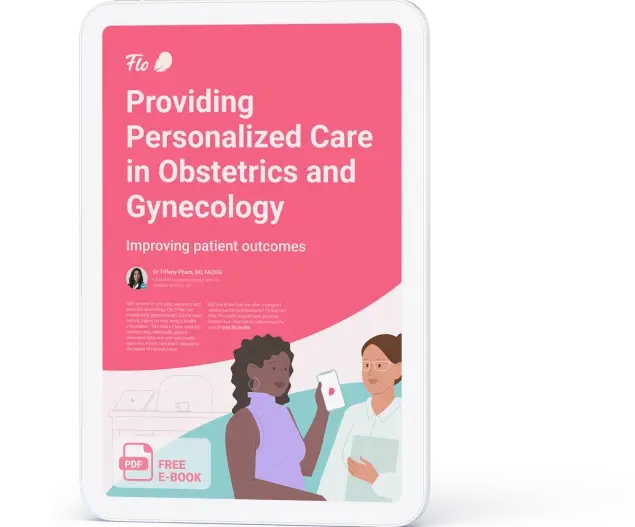.webp)
Published: 09 Dec 2024
Patients increasingly look online for answers when it comes to personalized care. According to data from the Centers for Disease Control and Prevention (CDC), in the second half of 2022, six in ten women used the internet to search for health information.1 The problem? There’s no guarantee that they’re finding reliable answers.
This is where technology and innovation step in, helping to transform how obstetricians and gynecologists deliver personalized care. Apps like Flo are redefining the patient experience by empowering them with knowledge while complementing the expertise of healthcare providers..webp?width=2080&height=1400&name=Rectangle%204083%20(2).webp)
Empowering patients
Flo is a female health app that allows users to track their menstrual cycles, pregnancies, symptoms, and more. Informed by evidence-based information, Flo supports 380 million users worldwide, who track their symptoms and view content to identify trends and relevant interests. As Boyle puts it: “Technology has the potential to help with personalized patient care by helping empower patients through knowledge.”
We’ve backed our efforts with a few core promises: accuracy, personalization, and security. This means providing accurate health information — including cycle predictions — delivering personalized content and keeping user data private and secure. All of this fits with professional advice. For instance, the American College of Obstetrics and Gynecology (ACOG) recommends that clinicians encourage patients to monitor their cycle length and pattern of menses to have a better understanding of their body in order to communicate any problems to their medical provider/clinician.2
For Boyle, apps like Flo can better inform patients about their health and any potential medical problems. “Patient health education through websites and social media sites, such as those provided by Flo, helps patients come to a medical visit well prepared and educated about their health so that they can best use their time with their doctor to choose the best care plan for them,” she explains.
The human touch
Today, personalized care means using data and technology more than ever. But it’s important to acknowledge our limitations in these areas. The future of personalized care in OB-GYNs, as in healthcare generally, will likely combine real-life human interactions with data. Because there are some things that technology can’t replace.
“Technology can’t be the only thing we rely on,” says Dr. Celestine. “There are some things you pick up on based on your expertise that, in my opinion, technology cannot replace.”
Dr. Boyle says likewise. “There is something healing and therapeutic in knowing that another person cares about you, that they are sorry you are suffering, and that they want to try to help you,” she says. “This is, in essence, the patient-doctor relationship at its core. This type of relationship will never be achieved solely through the use of technology.” While Boyle acknowledges the advantages technology can bring, she adds: “Technology will never replace our ability to share and offer advice and to extend kindness.”

